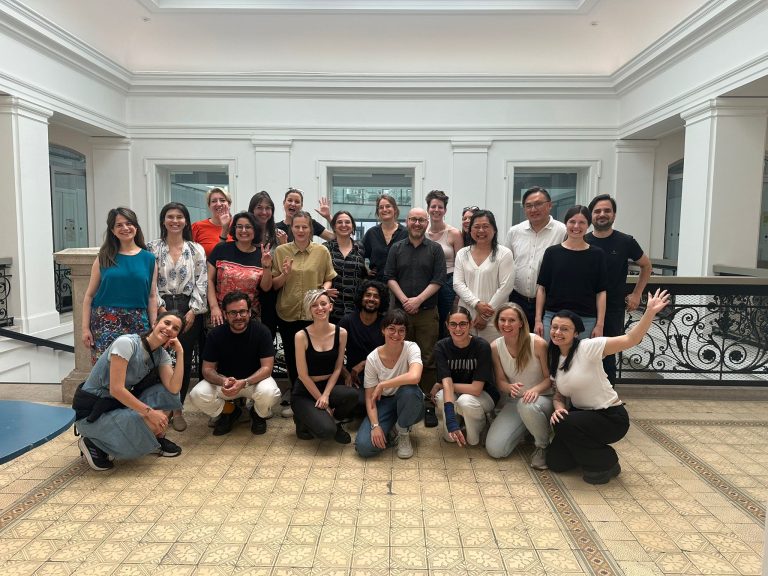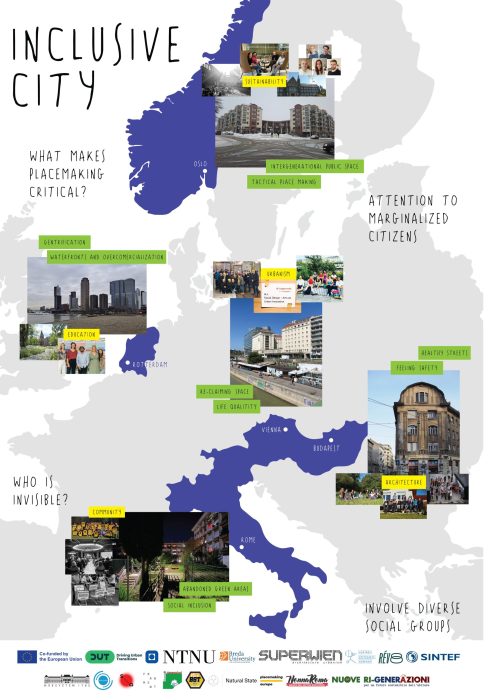Subscribe to our joint NEWSLETTER for
EUTROPIAN &
COOPERATIVE CITY MAGAZINE


The last week of May was really busy for our team! Parallel to the Kick-off of Good Cities in Tartu, Estonia, Eutropian’s Jorge Mosquera joined the Kick-off meeting in Vienna for another of our new project, InclusiveCity, funded by Driving Urban Transitions. It was fantastic to meet project partners in person, from Austria, Belgium, Hungary, Italy, Norway, and the Netherlands.
In the framework of the 15-minute city concept, the endeavor of InclusiveCity is to develop local services and critical placemaking methods as fundamental principles for participatory urban development. We seek to mitigate adverse effects such as commercialisation and gentrification while ensuring the inclusion of underrepresented groups.

To test methods with concrete field experiences, five pilot projects (Urban Living Labs) will be established in five European cities: Budapest, Oslo, Rome, Rotterdam and Vienna. These pilots, established with the involvement of local stakeholders, communities, and specific target groups, will address various Sustainable Development Goals corresponding to local challenges.
The kick-off event in Vienna aimed to lay the groundwork for the theoretical framework, methodology and launch of the Urban Living Labs by facilitating a series of workshops to discuss the vision and goals, learning expectations and dissemination of the InclusiveCity project.
The workshops also aimed to share critical placemaking research as well as discussing the tools and approaches of each ULL. The two-day workshops were complemented by walking tours and inputs at the site of the Vienna ULL (Donaukanal).
As a project partner, Eutropian drives concept creation for the five case studies and contributes to the research activities focusing on critical placemaking, and works with project partner Superwien on the de-commercialisation and social diversification of the Dunaukanal.
On the first day of the event, project partners got to know each other better in person at the unique location of floating swimming pool “Badeschiff Wien”, right at the Donaukanal (Danube-Channel), the area where Viennese partners will develop their placemaking activities.
Guided by Theresa Koenig & Lena Diete from superwien, and Caroline Cheng & Marianne Skaar from Sintef, project partners also began reflecting on their expectations (in terms of learnings) for InclusiveCity and presenting to the whole consortium the work on their local living labs.
Following this ice-breaker moment, a walking tour at the Vienna Urban Living lab site together with the local partners of the schwimmvereindonaukanal stimulated discussions on the challenges and risks related to waterfront placemaking with view of issues around commercialisation and community development.
After an introduction to the working and teaching space of Social Design and a presentation of their JPI project TRUSTMAKING, a workshop on the initial “Inclusive Placemaking approach” led by Milagros Hurtig (NTNU), Rana Habibi (Breda University of Applied Sciences), and Jorge Mosquera (Eutropian) prompted project partners to discuss in small, mixed groups (gender and geographically diverse) on the specificity of the groups’ placemaking approach. Every group discussion was conducted through a board where partners could craft a visual representation of their approach to be later shared to all partners.



The afternoon session started with a display of tools for placemaking by Ramon and Rosaria from Placemaking Europe: a “Tool Wall” was set-up for an exchange on placemaking tools.
Subsequently, a “world café” with different tables addressing the themes of gender, culture, intergenerationality, and marginalised groups further stimulated the placemaking discussion. Sharing successful and/or unsuccessful experiences and methods of placemaking working with specific social groups, partners could contribute to a shared understanding of the InclusiveCity approach to placemaking.
Finally, a discussion on conceptual frameworks and the potential of their use for local placemaking strategies was presented by SINTEF partners Caroline Cheng and Marianne Skaar.
A presentation of the upcoming Placemaking Week Euroe opened this final morning session. A reflection on the conference was coordinated by Natural State’s Kim Weger who aimed to discover our partners’ expected formats and learning outcomes from the Placemaking Week Europe.
Following this first moments of reflection we broke into small groups to discuss in more detail the same questions previously addressed, to come up with shared ideas for the Placemaking Week.
The final workshop of the kick-off event was dedicated to dissemination and communication (KÉK Hungarian Contemporary Architecture Centre) and the development of Strategy Academic papers (Marisa de Brito – Breda University of Applied Sciences)

| Cookie | Duration | Description |
|---|---|---|
| cookielawinfo-checkbox-analytics | 11 months | This cookie is set by GDPR Cookie Consent plugin. The cookie is used to store the user consent for the cookies in the category "Analytics". |
| cookielawinfo-checkbox-functional | 11 months | The cookie is set by GDPR cookie consent to record the user consent for the cookies in the category "Functional". |
| cookielawinfo-checkbox-necessary | 11 months | This cookie is set by GDPR Cookie Consent plugin. The cookies is used to store the user consent for the cookies in the category "Necessary". |
| cookielawinfo-checkbox-others | 11 months | This cookie is set by GDPR Cookie Consent plugin. The cookie is used to store the user consent for the cookies in the category "Other. |
| cookielawinfo-checkbox-performance | 11 months | This cookie is set by GDPR Cookie Consent plugin. The cookie is used to store the user consent for the cookies in the category "Performance". |
| viewed_cookie_policy | 11 months | The cookie is set by the GDPR Cookie Consent plugin and is used to store whether or not user has consented to the use of cookies. It does not store any personal data. |
